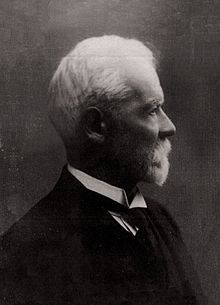Business administration
administration of a profit-oriented enterprise
(Redirected from Administrative work)
Business administration is a term used to describe a set of activities necessary to maintain the level of operations within business organizations. It is also the term for the study of management and organization.

- Henri Fayol, 1900.
Quotes
edit- Quotes are arranged alphabetically by author
A - F
edit- The technical and commercial functions of a business are clearly defined, but the same cannot be said of the administrative function. Not many people are familiar with its constitution and powers; our senses cannot follow its workings - we do not see it build or forge, sell or buy - and yet we all know that, if it does not work properly, the undertaking is in danger of failure.
- Henri Fayol (1900). "Henri Fayol addressed his colleagues in the mineral industry 23 June 1900." Translated by J.A. Coubrough. In: Fayol (1930) Industrial and General Administration. pp. 79-81
- The administrative function has many duties. It has to foresee and make preparations to meet the financial, commercial, and technical conditions under which the concern must be started and run. It deals with the organization, selection, and management of the staff. It is the means by which the various parts of the undertaking communicate with the outside world, etc. Although this list is incomplete, it gives us an idea of the importance of the administrative function. The sole fact that it is in charge of the staff makes it in most cases the predominant function, for we all know that, even if a firm has perfect machinery and manufacturing processes, it is doomed to failure if it is run by an inefficient staff.
- Henri Fayol (1900). "Henri Fayol addressed his colleagues in the mineral industry 23 June 1900." Translated by J.A. Coubrough. In: Fayol (1930) Industrial and General Administration. pp. 79-81
G - L
edit- The majority of students studying for the master's degree in business are enrolled in makeshift programs which are generally unsatisfactory... Business administration gets a much larger portion of poor students and a smaller percentage of the best students than do the traditional professional fields.
- Robert A. Gordon and James E. Howell. Higher education for business. 1959
- The term "informatics" was first defined by Saul Gorn of University of Pennsylvania in 1983 (Gorn, 1983) as computer science plus information science used in conjunction with the name of a discipline such as business administration or biology. It denotes an application of computer science and information science to the management and processing of data, information and knowledge in the named discipline.
- Paul Griffiths (2006) Proceedings of the 3rd International Conference on Intellectual Capital and Knowledge Management. p.129
M - R
edit- The administrative function... insures the continuance of the existing order with a minimum of effort and risk. Its fundamental aim is to "carry on" rather than to venture along new and untried paths. Administrators are, therefore, the stabilizers of society and the guardians of tradition. They are stabilizers in both a positive and a negative sense, for not only do they make possible the continuance of the ideas which they convert into institutions: they also frustrate many innovations to which they deny their support. With the weight of their authority they confront every attempt to initiate a new development, and test it with a view to its effect on established interests. They resist change and stow down the rate of experimentation so that the main body of society can keep pace with it. The ponderous social machinery which is so irritating to the impulsive initiator is thus a safeguard against sudden changes which paralyze the Jess adaptable members of society and which would result in chaos if subjected to no check.
- Paul Pigors (1935), Leadership or Domination, Houghton Mifflin Company. p. 264-8; As cited in Albert Lepawsky (1949), Administration, p. 9-10
- The administrative function comes easily to conservatives for the principal requirement of administration is unquestioning conformity to the standards embodied by the particular institution.
- Paul Pigors (1935), Leadership or Domination, Houghton Mifflin Company. p. 264-8; As cited in Albert Lepawsky (1949), Administration, p. 10
S - Z
edit- We usually think of an individual doing administrative work not as an administrator, but as a businessman, an Army officer, or a civil servant. More specifically, we think of him, if he is a businessman, as a merchant, a production man, a sales manager, or a financial expert; while the Army officer may be a company commander, a staff officer, or a tactician; and the civil servant, a diplomat, a postmaster, or a revenue collector. It is true that all of these jobs involve administration: yet each of them is intimately bound up with a more or less specialized subject matter and it does not follow that a good production man win make a good diplomat or company commander.
- Dan Throop Smith: "Education for Administration." Harvard Business Review, Spring 1945, vol. '3, p. 360
- To those who run businesses, profits are obviously desirable and losses deplorable. But economics is not business administration. From the standpoint of the economy as a whole, and from the standpoint of the central concern of economics — the allocation of scarce resources which have alternative uses — profits and losses play equally important roles in maintaining and advancing the standards of living of the population as a whole.
- Thomas Sowell, Basic Economics (4th ed., 2010)